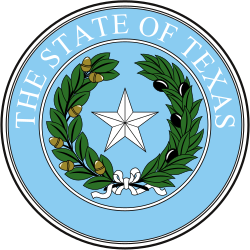| |||||||||||||||||||||
All 30 seats in the Texas Senate 16 seats needed for a majority | |||||||||||||||||||||
|---|---|---|---|---|---|---|---|---|---|---|---|---|---|---|---|---|---|---|---|---|---|
| |||||||||||||||||||||
 Republican win Democratic win Independent win Non-district territory | |||||||||||||||||||||
| |||||||||||||||||||||
| Elections in Texas |
|---|
 |
The 1869 Texas Senate elections took place in tandem with the 1869 Texas gubernatorial election and the election for the ratification of a new state constitution as a part of Texas's readmission to the United States following the Civil War. Texas voters elected state senators in all 30 State Senate districts. The winners of this election served in the 12th Texas Legislature, holding staggered six-year terms. This was the first time the Republican Party had ever won a majority in the Texas Senate, and it would be the only time they would do so until 1996.